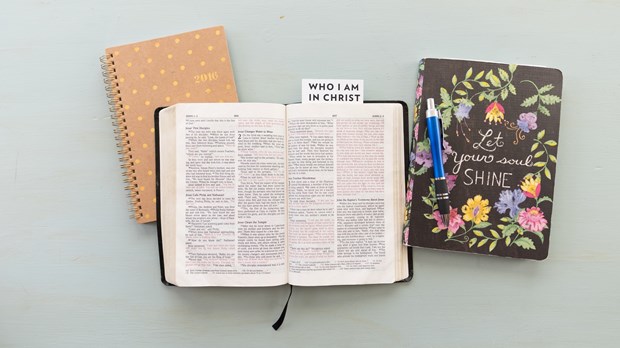I Am Enough

"Knowing God" is a phrase we often bandy about, but what does it really mean? Can we really know the great I AM? And if so, how? Pastor and author of Spiritual Disciplines Handbook and Invitations from God, Adele Ahlberg Calhoun is passionate about helping Christians pause and pay attention to how God has uniquely made us, is connecting with us, may be speaking to us through our experiences, or is drawing us to him through our desires. KYRIA spoke with Adele about the big question, "Who is God?" and what it means to know him deeply.
When we look at the big, profound question "Who is God?" a natural place to start is Exodus 3 in which God first reveals himself as I AM to Moses. What does this name tell us about God?
ADELE: In Hebrew this name means "I was, I am, I will be"; it's the entire essence of the being verb. This "I AM"-ness of God is ineffable, unnamable, more-vast-than-any-known category name. Because it's hard to grasp the idea of the God who is I AM, we often quickly add other descriptors onto God's name, such as, "I AM all-knowing" or "I AM all-powerful." These are certainly important attributes of God, but we must understand that first I AM stands alone.
God, I AM, has existence in and of himself—it's not an externally defined existence. God is who he is not because of a role or because of something he does. It's because of who he is. In this sense, knowing God as I AM challenges the way we understand our own identity.
In what way?
We often form our sense of identity around things we do, like "I'm a mother, a writer, a speaker." Or we get attached to thinking that we are our thoughts and our feelings. Yet Scripture is clear that our actions, thoughts, and feelings are not who we are—there's a deeper essence to who we are that's separate from those things. Our thoughts and feelings can change like the weather, but our true identity—our God-given, Christ-in-me identity—is something that is unmovable, unshakable, and true no matter what roles we play or what the "weather" happens to be.
Explain God's all-sufficiency further.
God is all-sufficient in and of himself as the Trinity. God has all the bliss, joy, and happiness anyone could ever want—they are utterly complete. So the fact that God created our world and us boggles my mind because the Holy One didn't do it out of need. Creating and extending to us his "This is who I AM" is an amazing act of generosity and welcome.
God's all-sufficiency also poses a challenging question: If God is sufficient for and in himself, how could he not be sufficient for me? And we must be careful not to confuse sufficiency with satisfaction because they aren't the same.
How does satisfaction come in?
Most of us will take the shortest tack to what satisfies us. So if it's brownies, I'll eat them. Or if it's not dealing with conflict, I'll deny that conflict exists. We're driven by a desire to feel satisfaction.
But when I AM offers me himself to sustain me, I have to accept that the Creator's understanding of sustaining me won't necessarily be the same as mine—it may not lead to feelings of satisfaction. Look at the life Jesus had: the Father sustained him, yet Jesus still had to die!
So for us truly to say that God, I AM, is sufficient, we must say that he, in and of himself, is enough. My life doesn't depend on the hopes, dreams, or goals I have that may or may not come to pass. What is sufficient is God himself. He promises that he will never leave or forsake us (Deuteronomy 31:6, 8).
How can we move from focusing on our own satisfaction to completely trusting and relying on I AM's sufficiency?
Practice expressing gratitude. When I'm grateful to God for the gift of life, I surrender all the questions about how God has worked in my life—the fact that he's given me life calls me to worship. Gratitude keeps us on our faces before God as we choose to say, "Thank you, even though this may not be what I wanted."
Gratitude isn't a natural reflex; it takes practice. It's a choice to say, "I'm grateful." It's believing that God is sufficient, that God is enough.
The Exodus 3 encounter is a type of invitation—God calls Moses into a deeper knowledge of who I AM is. How can we recognize similar invitations in our lives?
One simple place to begin is to notice your life. Start noticing what brings you joy, what you desire, what gives you life. When and how are you most able to connect with God? When is the veil thinnest? For example, I meet God in nature—it's the place where I'm my truest self and listen with my ears most open. For some it may be in their writing that their hearts are wide open and ears most attentive. It will be different for each of us—but we have to notice these things.
It's easy to neglect "noticing" when we're preoccupied with all we have to do.
Yes, we're often in such a hurry. But when I think about what it means for someone to find and know God, I think about when my children were little. We lived in a big Victorian house and in winter, when it would begin getting dark early in the evening, we'd turn out all the lights and play hide and seek. It was really fun: jumping out, surprising one another, lots of delighted giggling and laughing. Pervading it all was a sense that there was something wonderful to be found.
When someone's hiding in the dark, you pay attention, listen, and try to hear any small move he or she is making. Sometimes God plays a sort of "hide and seek" with us—the Holy One invites us to find him, and that means paying attention and listening. Am I really listening? Am I expecting to find something wonderful? Am I expecting to meet God?
How have you come to know I AM in a new way from how you knew him before?
Knowing God isn't necessarily about learning new things about him. My knowing God is a constant deepening. Years ago I could say I knew that God was love, but today I know that God is love in a bigger and deeper way. I know today that he can love me and still let me suffer.
I've also experienced a deeper understanding of God's presence. In another important conversation between Moses and God, Moses had all sorts of questions for God, but God's answer was simply, "My Presence will go with you" (Exodus 33:14, NIV). God will be with me to the end of the journey—that is enough.
Read more articles that highlight writing by Christian women at ChristianityToday.com/Women
 Read These Next
Read These Next
 Beautiful AngerHow can the same holy hands that punish the wicked pull the righteous to safety?
Beautiful AngerHow can the same holy hands that punish the wicked pull the righteous to safety? When Your Kids Abuse DrugsRaising substance-abusing sons helped me recognize my own waywardness
When Your Kids Abuse DrugsRaising substance-abusing sons helped me recognize my own waywardness
 A Different Kind of FastingThinning our lives to thicken our communion with God
A Different Kind of FastingThinning our lives to thicken our communion with God








 Homepage
Homepage
